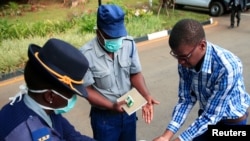African officials have confirmed 640 coronavirus cases and 16 deaths across 34 countries. However, those numbers are expected to rise as the continent realizes it has not identified everyone traveling to the region with the virus, said John Nkengasong, director of the Africa Centres for Disease Control and Prevention.
"This virus is a deadly enemy we are dealing with and we cannot look at the numbers and be complacent," he said. "It's going to change dramatically in the next week."
Despite health officials' best efforts, Nkengasong said, there are almost certainly people walking around with the virus and transmitting it to others.
"There are three scenarios that are happening, or might be happening," he said. "Scenario one was early on before we started to have the dialogue, there were no cases, that we're waiting for the cases to come. Scenario two is cases that are going in, we pick some and we are doing the appropriate things of containing them by isolating them. Scenario three is that people are coming in and they are slipping through and we are not picking them. It is very likely. Scenario two and three are very likely."
Nkengasong also said that Chinese health officials had greatly stepped up their support for the continent by holding a video conference with leaders of African health institutes.
The coronavirus outbreak began in the Chinese city of Wuhan and has killed more than 3,200 people in China.
"China yesterday started sharing more information with a whole host of individuals and public health leaders across the continent, and they had a video conference call yesterday with so many leaders across the continent to explain their experience, which we really value because understanding how to fight the virus will also depend on how much we know about the virus," Nkengasong said.
The Africa Centres for Disease Control have received 2,000 coronavirus tests from China and are expecting another 10,000 next week, he added.
A growing number of African countries are closing their air space, land and sea borders to prevent the spread of the virus. Nkengasong said that such actions were not always justifiable, but many countries were acting through the lens of a national security threat, a serious economic threat, and a humanitarian threat.





